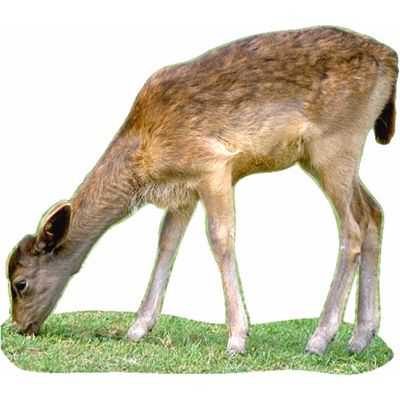From Longman Dictionary of Contemporary Englishfawnfawn1 /fɔːn $ fɒːn/ noun 1  [countable]HBA a young deer2 [uncountable] a pale yellow-brown colour
[countable]HBA a young deer2 [uncountable] a pale yellow-brown colour
 [countable]HBA a young deer2 [uncountable] a pale yellow-brown colour
[countable]HBA a young deer2 [uncountable] a pale yellow-brown colourExamples from the Corpus
fawn• Abandoned fawns have been reared on a bottle, only to die within a few months.• Colours were brutal and depressing; dank shades like dung and army-blanket fawn.• She has two young calves that look remarkably like fawns without spots.fawnfawn2 adjective CChaving a pale yellow-brown colourExamples from the Corpus
fawn• Her hair was a thick glossy bush of pale fawn brown, not quite shoulder-length.• A fawn jacket over the top.fawnfawn3 verb [intransitive] PRAISEto praise someone and be friendly to them in an insincere way, because you want them to like you or give you somethingfawn on/over I refused to fawn over her or flatter her. —fawning adjective→ See Verb tableExamples from the Corpus
fawn• Everyone crowded round, fawning at him and readily taking up his offer of free drinks.• The Salomon salesmen fawn over the thrift men.• The adverts scold us and cajole us and wheedle us and fawn us to keep up with the Joneses.fawn on/over• Now she's fawning over her mistress again and whatever plans Horatia has, you may be sure Connell will help her.• People were fawning over him, hoping for tickets.• With just a few honourable exceptions, congressmen fawn over him whenever he comes to town.• She, poor woman, had at last found a grown-up man, and showed her pleasure by fawning on Porua.• The Salomon salesmen fawn over the thrift men.Origin fawn1 (1300-1400) French faon “young animal”, from Latin fetus; → FETUS fawn3 Old English fagnian “to show great happiness”, from fægen; FAIN 
